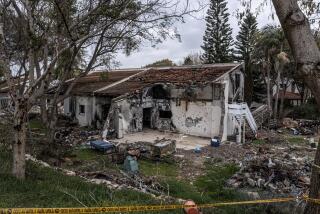U.S. Defense Chief Accepts Blame for Deadly Bombing at Saudi Base
- Share via
WASHINGTON — Defense Secretary William J. Perry formally accepted responsibility Wednesday for the June 25 truck-bombing that killed 19 U.S. airmen in Dhahran, Saudi Arabia, calling it a “tragic failure” by the Defense Department’s top leadership.
In testimony before separate sessions of the House and Senate armed services committees, Perry said that “to the extent that this tragedy resulted from a failure of leadership, that responsibility is mine and mine alone.”
His contrition appeared to impress members of the two panels in the wake of an independent report made public Monday that faulted senior commanders--along with Pentagon leadership--and intelligence agencies for failing to take enough precautions to prevent the terrorist attack.
Lawmakers on both committees complained that many of the anti-terrorism measures that the Pentagon announced after publication of Monday’s report should have been undertaken sooner. But they praised Perry for acting swiftly; they did not echo earlier suggestions that he resign.
The muted reaction--combined with President Clinton’s praise of the secretary after the release of the report--suggests that Perry is likely to ride out the criticism in the wake of the bombing at the Khobar Towers military housing complex.
In a similar incident, in October 1993, when 19 U.S. soldiers were killed in a firefight with militia forces in Somalia, then-Defense Secretary Les Aspin was criticized so heavily that Clinton later felt compelled to seek his resignation.
Monday’s report, compiled by retired Army Gen. Wayne A. Downing, asserted that U.S. commanders failed to respond adequately to warnings that terrorist activity was on the rise in Saudi Arabia and did not act on a report that Khobar Towers was a potential target.
The report criticized U.S. intelligence agencies for insufficiently analyzing the information they received and for failing to invest enough in recruiting on-the-scene agents to provide details about when and where an attack might occur.
The Pentagon announced steps Monday to beef up security for U.S. installations in the Middle East--from improving intelligence-gathering to buying more high-technology sensors to help detect would-be bombers.
Perry said Wednesday that the Pentagon has still not computed the new measures’ cost. But he said the proposals will probably cost billions of dollars.
As he did when the Downing report was made public, Perry told lawmakers Wednesday that the bombing at the housing complex had been a watershed event that “points the way to a radically new mind-set” about how the military must deal with the threat of terrorism.
*
While the military has always been concerned about safeguarding its forces, it now must place the threat of terrorism “front and center,” he said, adding that protecting U.S. troops against terrorist attacks “will now be one of the most important considerations we weigh.”
But he also rejected suggestions by some critics that the United States pull its forces back from Middle East bases, saying: “That is certainly a way of protecting them, but it is not a way of protecting our national interests.”
Although Perry essentially escaped any personal criticism in Wednesday’s hearings, panel members assailed Pentagon shortcomings in failing to prevent the Saudi bombing.
“Frankly, to say [that] I have grave concerns with what Gen. Downing found in his investigation would be an understatement,” Sen. Strom Thurmond (R-S.C.), chairman of the Senate Armed Services Committee, told the secretary.
And Rep. Floyd D. Spence (R-S.C.), chairman of the House National Security Committee, declared: “Many of us are left with the nagging conclusion that the [Pentagon’s new] measures . . . should have been undertaken sooner.”
The truck-bombing at Dhahran was the second attack that U.S. forces in Saudi Arabia suffered over the last year. In November 1995, an explosion in Riyadh killed five U.S. soldiers who were advising the Saudi Arabian national guard. Security measures were tightened then.
Downing, who also testified before both panels, said he generally was satisfied with steps Perry had proposed in response to his report.
He also said Air Force Brig. Gen. Terry Schwalier, commander of the U.S. force at Dhahran when the bombing occurred, had done the best he could to bolster security, even though Downing’s own report criticized him for failing to act more aggressively.
More to Read
Sign up for Essential California
The most important California stories and recommendations in your inbox every morning.
You may occasionally receive promotional content from the Los Angeles Times.













